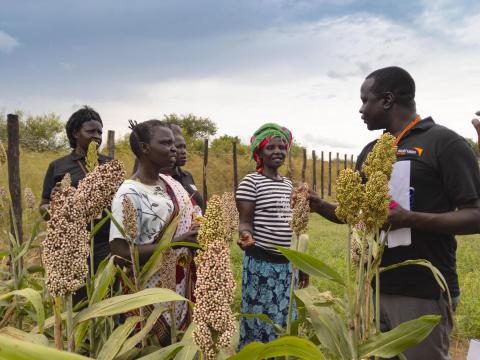World Vision kicks off climate resilience project for vulnerable agro-pastoral communities in South Sudan

15 May 2024, Juba City—The Government of South Sudan, through the Ministry of Environment and Forestry, and World Vision are launching today the Watershed Approaches for Climate Resilience in Agro-pastoral Landscapes (WACRESS) Project.
“Climate Change is currently the number one threat affecting the world and South Sudan is among the countries in the region that is most affected. The country is currently experiencing severe heat waves, droughts and unpredictable rain patterns. To address these impacts, the ministry of Environment and Forestry has developed climate change strategies and projects to mitigate and adapt to these impacts. The Project we are launching today is one of the projects that will be implemented in Aweil Center and Aweil East in Northern Bahr El Ghazal State,” said Hon. Josephine Napwon, Minister of Environment and Forestry.
WACRESS Project is a US$33 million climate resilience project under a co-financing scheme with the United Nations Development Programme (UNDP), Global Environment Facility (GEF), World Vision, United Nations Industrial Development Organisation, and the Government of South Sudan. in the project will build the resilience of vulnerable communities to climate change impacts while restoring ecosystems. The project will be implemented by World Vision and the Government of South Sudan in Aweil Centre and Aweil East in Northern Bahr el Ghazal State from March 2024 to December 2028. It aims to benefit over 75,000 people and restore over 15,000 hectares of land.
“We recognise that responding to climate change - including reducing, adapting to, and mitigating its impact and risks - as well as restoring the ecosystem, requires the collective efforts of various stakeholders. This includes the Government of South Sudan, national and state-level ministries, the UNDP, World Vision, and other partners, as well as the communities we intend to serve. No single agency or ministry can handle it alone. We are confident that, together, we can ensure that this project achieves its intended purpose of building resilience among vulnerable people in agro-pastoral communities. Our collective efforts will make a significant difference, and we are optimistic about the positive outcomes we will achieve,” said Dr. Mesfin Loha, World Vision in South Sudan country director.
The project aims to restore ecosystems and build long-term climate resilience among agro-pastoral communities using participatory watershed-based approaches. It will also re-establish and strengthen market linkages and agricultural value chains while equipping extension agencies to support communities in adopting gender-responsive, climate-smart agricultural practices and diversifying livelihoods using hands-on, farmer-field-based approaches. Climate change adaptation strategies and techniques will be integrated into management plans and programs in agriculture and natural resource management. Proactive collaboration and knowledge sharing will build synergies with other relevant initiatives.
“UNDP remains steadfast in its commitment to environmental conservation, a testament to our dedication to sustainable development and resilience building. This project emphasizes the urgency of addressing climate change, which presents significant challenges to societies, ecosystems, and economies globally, impacting agriculture, water resources, health, infrastructure, and livelihoods. Tackling climate change necessitates collective action and international cooperation. Through strategic partnerships and innovative initiatives, UNDP actively works to safeguard ecosystems, mitigate climate change impacts, and promote green solutions worldwide,” said Mr. Dominic Sam, UNDP Resident Representative in South Sudan.
Mr. Sam further stated that the UNDP endeavors to ensure the long-term health and resilience of our planet as it continues to implement community-based conservation projects and advocate for policy reforms. “By empowering local communities, harnessing technology, and mobilising resources, UNDP plays a crucial role in nurturing environmental stewardship and fostering a more sustainable future for generations to come,” he added.
Dr. Loha expressed his gratitude to the all the partners and donors particularly the UNDP and the Ministry of Environment and Forestry: “The WACRESS project is a flagship project for South Sudan, and we appreciate the UNDP for taking the lead and the Ministry of Environment and Forestry for championing the project from its inception through its design, and even the intense financial negotiations with GEF.”
Dr. Loha also undercored the importance of sustainability and how this project has the potential to , “Today is also about sustainability. The project aims to achieve sustainable livelihoods to address hunger and malnutrition, as well as sustainable interventions to address the impact of climate change in South Sudan. World Vision has established a robust structure and a dedicated team that will collaborate with all key stakeholders at all levels. Our goal is not only to ensure the success of this project, but also to pave the way for more opportunities and larger-scale projects in South Sudan. This project is just the beginning of a transformative journey.”
The WACRESS Project is scheduled to have a state-level launch in Norther Bahr el Ghazal to be followed by an inception workshop in Aweil Centre on 21-23 May 2024.
For more information, contact:
Francis Harold Kasangu
WACRESS Project, Senior Project Manager
World Vision South Sudan
francis_kasangu@wvi.org, +211927910965
Diwa Aquino-Gacosta
Senior Manager, Advocacy and Communications
World Vision South Sudan
Diwa_aquino-gacosta@wvi.org, +211921885991